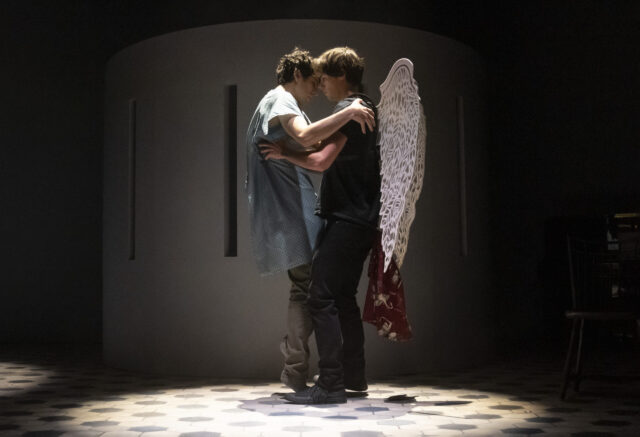
Letters from Max follows the epistolary relationship between a teacher and her student (photo by Joan Marcus)
LETTERS FROM MAX, a ritual
The Pershing Square Signature Center
The Alice Griffin Jewel Box Theatre
480 West 42nd St. between Tenth & Eleventh Aves.
Tuesday – Sunday through March 26, $49-$139
212-244-7529
www.signaturetheatre.org
As you enter the Alice Griffin Jewel Box Theatre at the Signature to see Sarah Ruhl’s Letters from Max, a ritual, a quote from Max Ritvo in handwritten cursive is projected on the back wall of the stage: “Even present tense has some of the grace of past tense, what with all the present tense left to go.” Unfortunately, there was not a lot of present tense left in Ritvo’s too-short life, but his legacy is preserved in the moving play, which centers around the letters, texts, voicemails, and conversations the young, enthusiastic poet had with Ruhl, the award-winning writer of such plays as In the Next Room (or The Vibrator Play) and The Clean House.
In 2012, Ritvo was accepted into Ruhl’s playwriting class at Yale. That began a four-year friendship in which the two shared an intimate and emotional correspondence as Max faced a recurrence of his pediatric cancer, Ewing’s Sarcoma, but did so with charm, whimsy, and hope. They discuss poetry, soup (“Soup is your religion,” Max tells Sarah), Halloween, various medical treatments, Einstein on the Beach, the streets of New York City, the afterlife, the existence of the soul, and reading and writing, with an enchanting honesty and humor.
The story is not a traditional tale of a mentor and mentee; Sarah and Max bring out the best in each other, both learning as their closeness deepens. “You know, in some ways, you are my teacher, not the other way around,” Ruhl says early on.

Sarah Ruhl (Jessica Hecht) and Max Ritvo (Zane Pais) explore life and poetry in Signature play (photo by Joan Marcus)
Hecht is terrific as Sarah, who she knows well, having appeared in Ruhl’s Stage Kiss at Playwrights Horizons in 2014 and pandemic microplay What do you Want What do you Want What do you Want for the Homebound Project; she portrays Ruhl with a tender confidence and just the right amount of mothering. A tireless actor who starred with Mikhail Baryshnikov in Arlekin Players Theatre’s hybrid Chekhov reimagining The Orchard last June and will next appear in David Auburn’s Summer, 1976 with Laura Linney on Broadway beginning April 4, Hecht has a quirky and distinct singsong voice that fits the character, especially when she recites poetry.
Ritvo is alternately played by Ben Edelman and Zane Pais; at each performance, whoever is not playing Max appears as Tattoo Artist Angel — based on a short work Max wrote in Ruhl’s class — and plays Ritvo’s songs, Edelman on piano, Pais on guitar. The actors do not attempt to mimic the real-life Sarah and Max but concentrate on bringing their essence to the stage, as related through their correspondence.
Marsha Ginsberg’s set is centered by a large semicircular object that recalls a zoetrope onto which S Katy Tucker projects words and images and opens up to reveal Max in a hospital bed. In a far corner is a piano; the soft lighting is by Amith Chandrashaker, with sound by Sinan Refik Zafar and costumes by Anita Yavich, highlighted by the angel outfit.

Ben Edelman and Zane Pais switch roles every night in Letters from Max (photo by Joan Marcus)
Ruhl first collected the material in the 2018 epistolary book Letters from Max: A Poet, a Teacher, a Friendship, then adapted it for the play, which was not initially planned but developed after Ruhl gave several public readings of the book. Director Kate Whoriskey (Sweat, How I Learned to Drive), who helmed Ruhl’s Dear Elizabeth, based on letters exchanged by poets Elizabeth Bishop and Robert Lowell, keeps the bells and whistles to a minimum; the show could use some trimming, however, as it gets repetitive and, at times, overly reverential. It would probably fare better at a streamlined ninety minutes instead of two hours with intermission.
In the lobby, the audience is encouraged to write a letter of their own to a loved one they think needs to hear from them. “I hope that this play can be an invitation into ritual or catharsis for whatever grief might be ailing you,” two-time Pulitzer finalist Ruhl explains. The Signature provides pen, paper, envelope, and even a haiku and will mail it for you.
Ultimately, the relationship between Max (Four Reincarnations, Aeons) and Sarah is summed up by these words from Max: “We’ll always know one another forever, however long ever is. And that’s all I want — is to know you forever.” Through these letters, the book, and now the play, Max gets his wish.